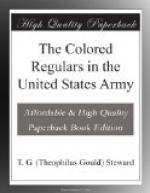Wheeled vehicles of war suffer more than other troops, on account of their stationary positions. It is here that the dreaded sharpshooter comes in for glory, by picking off the gunners and other individuals.
Pack trains were seen dashing along the line with that always absolutely essential—ammunition—thereby gladdening the hearts of the boys who were doing their utmost to expend every round in their belts to gain another foot of Spanish territory.
During all these stirring events the stomachs of the real heroes were not neglected, and most certainly not along our part of the line. Pack mules were brought right up to the line under a hot fire, loaded with sugar, coffee, bacon and hardtack, all of which was in plenty. Some of the mules were killed and wounded, but this did not retard the advance of the train. When near the firing line some one called, “Whose rations?” A prompt reply, “Hungry soldiers.”
The daring horseman was all that was needed to make the situation complete. Without participation of cavalry, the ideal warrior disappears from the scene, and the battle and-picture of war is robbed of its most attractive feature.
Late in the afternoon, July 1, I was directed to take Saddler Sergeant Smith and bring to the firing line all the men I could find of the regiment. Going to the dressing station, collected those who had brought or assisted wounded there, thence across a portion of the field passed over a few hours previous. Men were found almost exhausted, soaking wet, or a solid mass of mud, resting as comfortably as if in the finest of beds; many of them had been on picket duty all night before, to which was added the hard day’s work not then completed. After locating all I could, we went to the crest of the San Juan Hill, to the left of the sunken road, where the First U.S. Cavalry was reforming, and there picked up a few more who had joined that regiment.
The Tenth Cavalry having in the meantime taken another position, I set out to find it, going in front, telling Smith to bring up the rear. We were detained a short time near Sunken Roads by shells from Cervera’s fleet, which were falling in it at a lively rate. Barbed wire prevented us from “running the gauntlet.” Shortly after crossing the road an officer passed us, his horse pushed to his utmost, telling us to take all the ammunition that we possibly could on the firing line. About that instant, the pack train came thundering by, which we relieved of a few thousand rounds in short order. I was much amused at one of the men who innocently asked, “Where are we to get axes to burst these strong boxes?” The job was speedily accomplished before the boxes were on the ground good, and most certainly in less time than it would have taken to explain matters to the inexperienced. We were soon off again, tramping all over the country, through darkness, running into wire entanglements, outposts and pickets, and within fifty yards of the enemy (subsequently ascertained).




